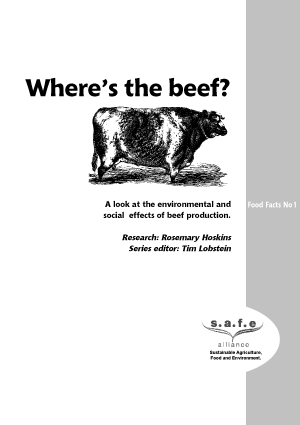Where's the Beef? (Food Facts No. 1)
A look at the environmental and social effects of beef production (1998)
 The crisis in the beef industry is an opportunity to move towards less damaging and more sustainable farming methods, argues this report from the SAFE Alliance (now Sustain).
The crisis in the beef industry is an opportunity to move towards less damaging and more sustainable farming methods, argues this report from the SAFE Alliance (now Sustain).
The emphasis on increased productivity in the beef industry is at a cost to both the environment and our health, with animal welfare, agrochemical, waste, transport and nutritional consequences. In contrast, alternative production systems, such as organic and extensive grazing, can be vital to nature conservation and produce healthier beef. The report examines issues of concern for consumers, the food industry, government and the environment, including:
Meat miles: In intensive beef rearing systems the cattle are fed diets rich in protein and energy including barley, wheat, soya beans and soya cake (soya beans with the oil extracted). Feed is often imported from overseas, where it is estimated that two acres are farmed for every acre in Europe in order to meet our requirements for animal feed, some of it for intensively raised beef. Such imports add to the environmental problems of transport pollution. Imported beef and beef products travelling distances such as 12,000 miles from Zimbabwe add to these food miles as well as undermining UK farmers.
The retailer’s cut: In the 1990s, the BBC's Farming Today programme followed a bullock from farm to supermarket shelf to see who, if anyone, was making money out of beef. The farmer had taken three years to raise the bullock and lost £32 on the sale. Between the stages of abattoir and retail sale a margin of over £800 was made on the animal. Yet the main supermarket chains have denied that they are making an unfair profit on beef.
Intensive beef: Extensive systems of beef rearing are used by most UK beef producers, with herds of cattle mainly grazing on open grassland. 15 to 20% of the beef produced in the UK comes from intensive systems where animals are kept in crowded sheds for much of their lives, before slaughter at 12-16 months. Until the BSE ban on older cattle being used in the food chain, much of the beef used in processed products such as pies and burgers came from the dairy industry. Cows past their useful milking life were used. Now they are slaughtered and incinerated.
Beef with benefits: Traditional extensive grazing systems can be vital for maintaining the habitats of wildlife sites such as grasslands and moorlands. In many cases the environment has evolved with grazing. The case study of an organic beef farm below illustrates how traditional beef farming systems can be both of benefit to the environment and play their part in the local food economy.
The report concludes with recommendations for consumers
- Support extensive farmers whose beef cattle are important to areas of natural interest. Where possible, buy extensively reared beef with the Mature Assured Beef label.
- Find out about local farmers' markets. Consider getting involved in setting one up.
- Buy direct from the producer and ask about the systems used to produce your food. Contact the Soil Association for their directory of farm shops and delivery schemes.
- Look for organic beef suppliers. A directory of where to buy organic food is available from the Soil Association and in The Shoppers Guide to Organic Food by Lynda Brown (Fourth Estate Ltd. 1998).
- Reduce your consumption of saturated fat by choosing meat from extensively-reared animals.
- Reduce overall fat consumption by buying the better quality cuts rather than processed meat products.
Published Saturday 1 February 2003
Food Facts: A series of short reports on over a dozen different products, shows how people's shopping choices - as well as government policy - can protect the environment, enhance social justice and improve health.
